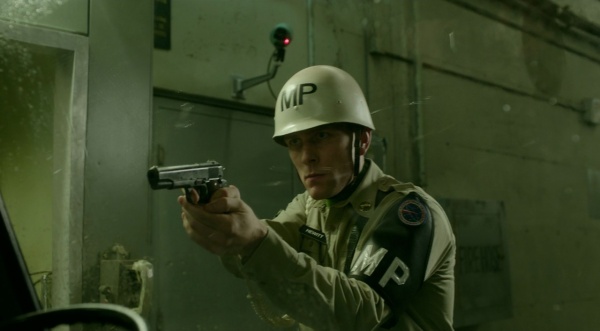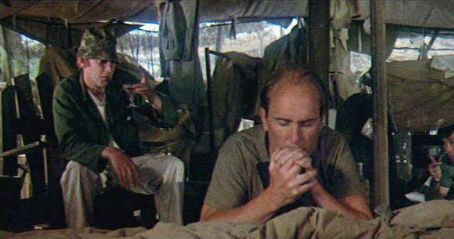Way back in 2009, writer-director Jody Hill’s black comedy Observe and Report rode a wave of controversy to modest box office success and, perhaps better in the long term, notoriety. The deeply imperfect film is awfully enamored with its own ostensible subversiveness, confusing self-flattery for gimlet-eyed realism. If it sounds like I’m kind of down on the movie, I kind of am, except for one aspect of it that actually is subversive, that actually does buck against the status quo of Hollywood and film culture, and the arts in America as a whole: its portrayal of Nell (Collette Wolfe), a character who is not merely a Christian but a born-again Christian, as a genuinely kind person who is not hiding darkness and hypocrisy within her. Hill’s attitude to pretty much everyone else in the film is bilious, but in this instance he refuses to construct the easy villain that will flatter his audience’s worldview. (I suspect Born Again Christians did not make up a large percentage of Observe and Report’s audience.) She held one of a handful of character traits that more often than not, in American films, signal that This Person Is Not To Be Trusted: active Christianity, military authority (grunts are sometimes fine, though certainly not always), political views that are to the right of Jane Fonda. That sort of thing. For decades, this has been part of our storytelling tradition — one that filmmakers and critics alike are inured to thanks to the privilege that accompanies being a liberal working in the arts — and it allows the audience to easily identify a villain, or a potential villain, before they’ve even had a chance to do anything wrong.
Consider M*A*S*H, Robert Altman’s 1970 breakout film, in which we are introduced to the character Frank Burns (Robert Duvall) when the film’s main protagonist Hawkeye (Donald Sutherland) joins the unit and is shown by Capt. Forrest (Tom Skerritt) to the tent he’ll be sharing with Burns. The two men find Burns in the tent, teaching Ho-Jon (Kim Atwood), who works as a mess-boy on the grounds of this particular mobile Army hospital, to read English using the Bible. Burns is a Christian, and Hawkeye and Forrest regard the situation with a smirking cynicism, offering the boy a nudie magazine as a better way to learn the language than the Bible. On one level, fine, objecting to missionary conversion, which is the subtext here, makes sense and is a defensible moral stance. But Burns treats Ho-Jon very kindly in this scene. Whether or not a given audience member views the religious tradition in which he is engaging here as ultimately damaging (never mind the charitable aspects of missionary work), Burns himself appears to be a very nice and moral person. One may disagree with him, but perhaps one can respect his decency at the same time.
Or maybe not. Shortly after we’re introduced to Frank Burns, there’s another scene where he enters the same tent. Hawkeye and Forrest are already there, being served martinis by Ho-Jon. (One might say the two white men are both condescending to and exploiting the Korean boy, but never mind.) Soon after Burns arrives, Ho-Jon leaves. Hawkeye and Forrest offer Burns a martini, which he declines, saying he doesn’t drink. Hawkeye makes fun of him for that. Burns then kneels at his cot and begins praying. The whole time he does this, Forrest and Hawkeye mock him (“You ever encountered this syndrome before?” “Not with anyone over the age of eight years old”). Not because he’s doing anything wrong, but because he’s praying. Of course, it eventually turns out that Frank Burns is one of the film’s villains when he blames someone else for the death of a patient that he caused. No matter: we’re already supposed to hate him. His (eventual) villainy is merely confirmation of what his Christianity ostensibly communicated to us: he is bad, because our prejudices are correct.
Now, M*A*S*H being a Robert Altman film, things are a tiny bit more complicated than that (though I’d argue the film is still among his worst), as there is another Christian character, Father Mulcahy (Rene Auberjonois), whose ineffective faith in the face of human horror renders him merely pathetic rather than actively vile.

But this sort of thing needn’t be complicated at all! Look at Guillermo del Toro’s The Shape of Water, which won the 2017 Best Picture Oscar. In that film, about a janitor (Sally Hawkins) who works at a top-secret military lab in the 1950s and falls in love with a humanoid amphibious creature (Doug Jones), it’s established early on that the men who run this lab, led by Colonel Richard Strickland (Michael Shannon), are small-minded, mean, cruel, in some cases racist. If there’s a shining moral light in the lab, apart from the cleaning staff and the sea creature, it’s the scientist Hofstettler, played by Michael Stuhlbarg, who we eventually learn is a Soviet spy. Del Toro doesn’t seem especially enamored by the other Soviet agents who appear in the film – they’re among the film’s many villains, in large part because they have succumbed to decadent American bourgeois living – but Hofstettler’s commitment to science and humanity means he is basically good.
The same can’t be said of the American military in the movie. So much so that when we get to the part of the story where our motley crew of heroes carries out their plan to free the amphibian humanoid from the lab, Hofstettler, a willing participant in this plan, uses a syringe of poison to, well, let’s not mince words here, murder an MP who stopped the van the film’s heroes were using to commit their act of sabotage.
It should be noted here that we have not seen this MP in the film before. He’s a grunt. Not particularly important. We just know that he’s a member of the American military, which has been depicted throughout as racist, cruel, et cetera. Because this young man chose to join the Army, he must be those things, too. Of course, if del Toro wanted to complicate things and make his film interesting (which it is not, and I say this as a del Toro fan), this murder would reverberate among our heroes. Some rumination might occur: “We have done this good thing, freeing an innocent creature who was being tortured, but in doing so we have also done this evil thing.” But no, after the MP is killed, Giles (Richard Jenkins), the driver of the van who saw Hofstettler commit that murder, says, in a humorously trembling voice “I think he just killed that man!” This is meant to be funny, because part of Giles’s deal is that he’s usually not the kind of guy to take big chances or do things that scare him, but gee oh boy, look at him now! This is the only acknowledgment, apart from the audience’s own eyes, that the death even occurred.
That American soldier is never shown doing anything wrong, but the audience is meant to be happy that he’s taken out. At least Charlie Peck, Dennis Quaid’s character from this year’s The Intruder, eventually murders somebody. But of course, that is simple plot mechanics; by the time of his misdeed the audience already dislikes him intensely because when we first meet him he is doing something legal and civically responsible, and this we cannot have. At the beginning of the film, Scott and Annie (Michael Ealy and Meagan Good) are shopping for a house. They find one they like tucked away in a nice, secluded, woodsy area, and while looking around they see a deer, who, despite the enchantment the couple feel in their hearts, is immediately shot down by Peck. Peck is the former owner of the house, and has been maintaining the place while it’s on the market. He tells the horrified couple that it’s important to keep the deer population down (which in many parts of the country is true!) and in any case, that’s why he was on the property — to hunt legally — and he didn’t see the couple before he fired. But he shot a deer and, worse, owns a gun. The murder he eventually commits is, in terms of audience manipulation, merely a formality.
There’s a scene later in The Intruder that is instructive. Charlie has been invited by Scott and Annie to a dinner party (despite Scott’s insistence that anyone participating in gun ownership and legal hunting is a dangerous psychopath). At one point, one of the other guests (the eventual murder victim, in fact) disagrees with something Charlie says. It’s a minor point, but the film suddenly changes its point of view from Scott and Annie to Charlie, and we see a fantasy: Charlie standing up and violently attacking the man who challenged him. Again, this didn’t actually happen in the world of the film, it’s in Charlie’s mind, but director Deon Taylor and/or writer David Loughery felt it necessary to briefly up-end their film’s whole structure so that the audience could see the violent thoughts in Charlie’s mind. Perhaps because they realized they hadn’t laid the necessary groundwork to justify Scott’s paranoia, which is essential? Or because they think passing fantasies are the same as action? It can’t possibly be both, can it? Surely when casting those with whom you disagree as the villain, more thought is put into it than that.
It’s all a matter of empathy, an emotional and intellectual state that demands you try to understand the feelings of everyone, especially those with whom you might not side with in a given situation. (If you’re already prone to siding with someone, it’s not really empathy when you agree with them.) Films that are truly empathetic can pose a challenge for the audience (not to mention the filmmaker) and are therefore best left unproduced. Usually, anyway. In Debra Granik’s 2010 film Winter’s Bone, Jennifer Lawrence plays Ree Dolly, a young woman living in Appalachia. Due to her missing father, sick mother, and the secluded criminal environment she was born into, Ree must raise her two young siblings; out of desperation, she decides to join the Army, because she heard that by doing so a person is guaranteed $40,000.
She meets the Army recruiter at the local high school, and I, when I first saw the film, habituated as I’ve become to the very idea of military recruitment of young people being presented in modern American films as anything other than insidious and exploitative, was somewhat shocked by the scene as it unfolded. The recruiter (Russell Schalk) doesn’t try to fool Ree, doesn’t try to entice her into giving up her life and family just so he can throw her into machine gun fire. No, he actually talks her out of it. The recruiter sees how difficult her life is, sees her bruises, and teases out of her the fact that she’s raising her brother and sister alone. He tells her that she needs a better reason to join the Army during wartime than $40,000, and that she’d be doing more good back home.
I was quite unprepared for Debra Granik’s actual empathy. The cinema could use more of it.



No comments:
Post a Comment